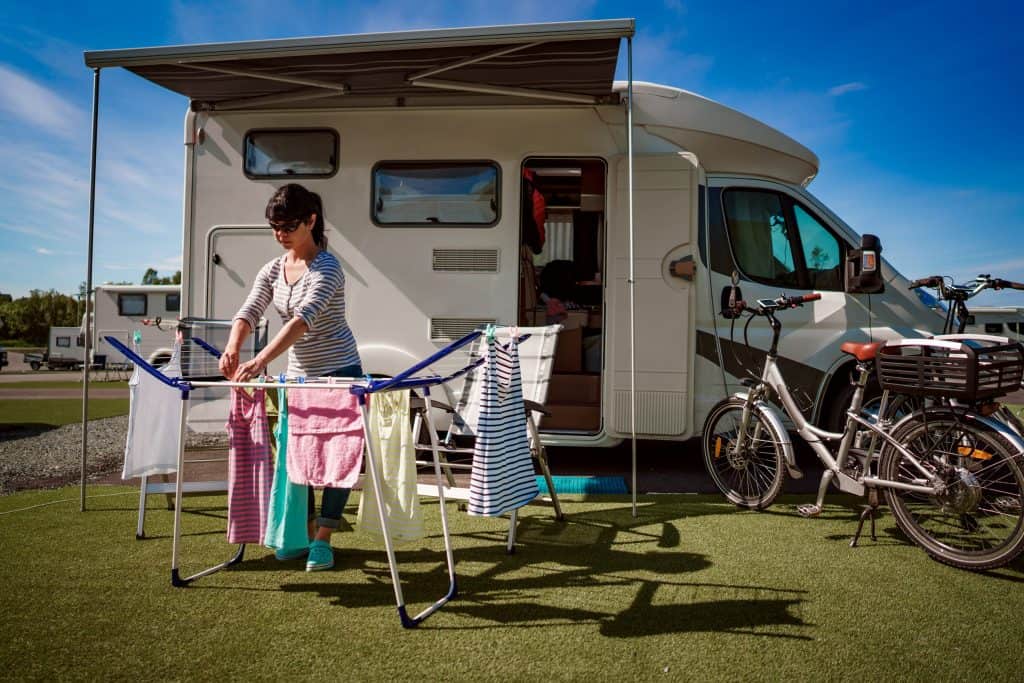
Hello there, fellow RVers! This week I am going to address a very important topic: laundry. When you go off traveling in your RV for more than a few days, it becomes important to figure out how you are going to get your clothes clean.
What are some ways you can do laundry while traveling in an RV? The most time-consuming way is to wash your laundry by hand, while the most expensive way is to buy a washing machine for your RV. A meet in the middle option is to use laundromats as you travel to and from locations.
There a lot of options that you have when it comes to doing your laundry on the road. They range in price from free to way-expensive, and I’m going to walk you through them all!
Cost-Effective Option #1: Wash It Yourself
Have you ever washed your clothes by hand? If not, you are missing out! There is something soothing about washing your own clothes with your kids. Like doing any other chore with them, it’s great bonding time, but washing your clothes by hand also teaches you an appreciation for
That is because washing machines have probably given us more free time than any other machine! Personally, I lived for a year and a half without a washing machine. I am sure glad I have one now, but I still get bugged at how it doesn’t get the clothes as clean as when you clean them yourself, by hand.
Here are the steps for washing your own clothes while RVing:
- Step One: Separate the lights from the darks. If you have a lot of white clothes, you can also do those in a separate load.
- Step Two: Load up the clothes into a bin. Fill up the bin with warm water, if available, or if not, cold water is fine. Add and dissolve the detergent before adding the clothes. When adding the clothes, don’t add so many clothes that they can’t move around, leave at least enough space so that they are free floating a little.
- Step Three: Let it soak. This is an advantage that you have over washing machines: time. You can let your clothes soak for as long as you want, although I don’t recommend going for more than 5 or 6 hours for most regular dirty clothes. Shoot for at least 20-30 minutes of soaking.
- Step Four: Scrub. Now its time to get your arms in and act like a washing machine. Give some motion to the potion. The exact motion doesn’t matter so much, just give it some movement. You will see the water get even darker during this step. At this point it is good to rub the clothes against themselves. Scrub really hard. This is your chance to focus on the clothes that are especially dirty. The way to really get clothes clean when you wash them by hand is to scrub them against themselves.
*Pro Tip: If you want to save time, let your RV do the mixing and soaking for you! Put in your water, detergent, and clothes, give it a quick mix, and set the tub in your shower while you are traveling on the road. The motion of the vehicle will give the clothes enough movement to loosen the dirt. This could save you some time.
- Step Five: Rinse. Dump out the water and refill with fresh water. Use your arms again to really work all of the detergent out of the clothes.
- Step Six: Dry. This is the longest part by far. The best way to dry is to set up a clothesline between some trees or other structures. If you forgot a clothesline, you can use a picnic table. Squeeze and twist each article of clothing to get the majority of the water out. Use clothespins to hang up the clothes. Drying will occur at the fastest rate when there
is full sun and a breeze. If rain starts coming in, you will obviously want to run grab your clothes off of the clothesline as fast as possible and bring them inside!
Any normal laundry detergent should work just fine for doing your laundry by hand, but if you wanna get picky, use a detergent made for cold water.
I know that Tide has a cold water formula, and most other brands to do. Personally, I like to use a biodegradable, plant-based detergent that won’t put a ton of crazy chemicals into the water supply.
Some of these include Seventh Generation and Boulder Detergent. Both of these detergents are designed to work well in cold water. As a backup, Foca Detergent is great for doing your own laundry. Foca is a Mexican brand of biodegradable detergent that is designed to be used by people doing their laundry by hand in cold water.
The instructions are even given as if you were going to do your laundry by hand. Foca can be found at most Walmarts with a decent sized Latino food section. But like I mentioned, any detergent should work fine.
This is also a good skill to have for when you are camping without water or electric hookups. Washing your clothes by hand, using water from a river or lake, will save your precious batteries and water tank for the things that matter most.
Note that this type of washing will not do well in the winter, as you will have to wash and dry your clothes inside the RV.
Cost-Effective Option #2: Go to the Laundromat
This one is a pretty popular option. Taking your clothes to the laundromat doesn’t take near as long as washing your clothes yourself. But it does usually require you to stick around for an hour or two.
Laundromats today are upgrading themselves to be exciting places to hang out – I mean, well, at least they usually have wi-fi now. Some will even have a playground for kids to go crazy on.
Laundromats charge per load, but they usually have pretty big machines. On average you will be looking at about a $2.00 charge to wash and about $2.00 to dry per load. This can add up quick but is certainly less money than buying a washer for your RV (unless you are living in it full time or a lot of the time).
So doing laundry in a laundromat is probably the fastest option, assuming that it is located close by. There are usually plenty of machines available to use, meaning that you can wash all of your clothes together and then dry them all together.
This is also a good time to get some work done, if you are working while on the road, or to talk to locals about the best things to see around the area.
Still Pretty Cheap Option #3: Drop Off/Pick Up Laundry Service
It’s like dry cleaning, but for all of your clothes! Some laundromats will offer you the option of dropping off your clothes and picking them up later.
They will wash, dry, fold, and iron your clothes and have them ready for pickup soon, usually by the next day at the latest.
This type of service usually charges per pound. My place here in Denver charges $2.95 a pound, or $1.50 for members of the laundromat.
Cheap But Requires Some Effort Option #4: Buy a Washbin
There exists a machine that is something between a normal plastic bin and a traditional full-on washing machine. This machine is pretty much a giant salad spinner – dryer. These come in both electric versions and elbow grease versions. They are popular in Latin America.
The idea with these is that you wash your clothes and then put them into the salad spinner. The spinning motion will get much of the water out of the clothes, making them dry faster on the clothesline, or wherever you dry your clothes at.
Some of these are designed to let you wash your clothes right in the same drum as where you do the spinning once the water is drained out.
A Bigger Investment Option #5: An RV Washing Machine of Your Own
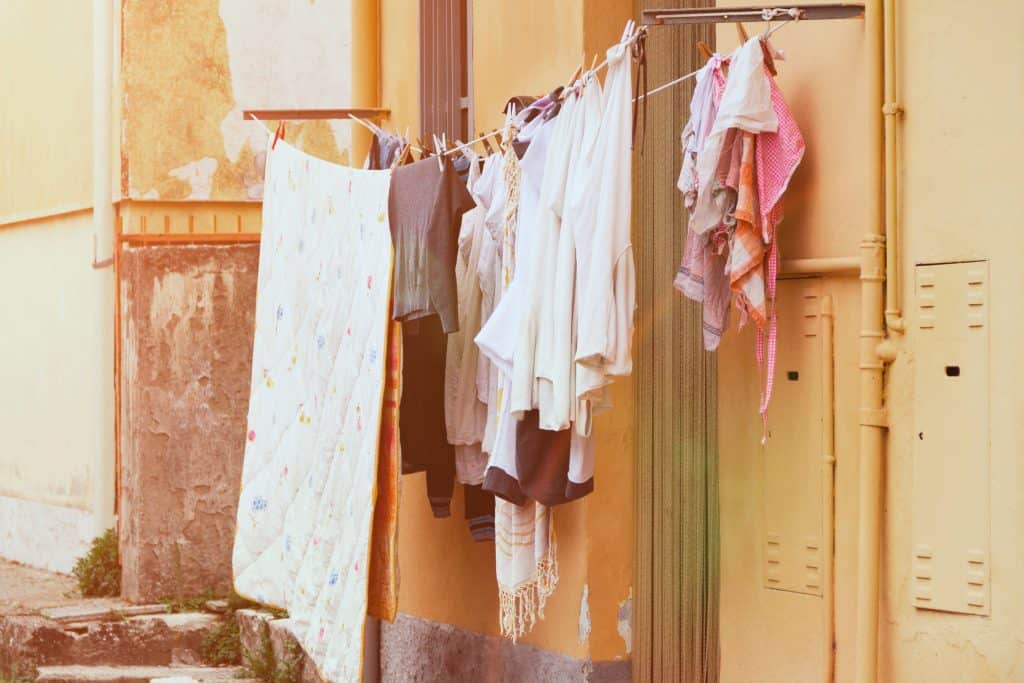
What we are talking about here is not exactly your normal washing machine. It is smaller and fits more easily into an RV. But in terms of function, it does basically what a washer does. This machine will pretty much do the job of washing your clothes for you.
All you have to do is put in your detergent and clothes and it will agitate them for you. After a rinse, it will rapidly spin the clothes to get much of the water out. Keep in mind that you will still have to hang them up to dry afterward.
I personally think that this is a great option. They are fairly cheap. One of these compact washers will set you back anywhere between $100 to $200. That is the cost of about 15 trips to the laundromat.
They do a good job at washing without your supervision. And the spin at the end really does help get a lot of the water out, making the clothes drier and ready to come off of the clothesline quicker.
This type of washer can be installed fairly easily too. All it requires is a water source, a drain, and electricity. Chances are that you could find a place somewhere in your RV for one if you really felt like it would be a help to you.
Most Expensive Option #6: Buy a Washer/Dryer Combo
Yes, you heard me right, a washer/ dryer combo is a thing! This is a machine that will wash your clothes and dry them right after. Some RVs even come with them installed! This is the most expensive option not only in terms of price but also in terms of resources.
This machine will take a lot of water and electricity. If you do most of your camping not hooked up to plug in electricity or water, then this is probably not the option for you.
It makes sense that a washer/ dryer combo would be invented for RVs because they are already so tight on space. Its greatest strength, however, is also its greatest weakness. The washer/ dryer combinations usually do not have the capacity for more than 10 or 11 pounds of clothing or bedding.
The washer/ dryer combinations usually do not have the capacity for more than 10 or 11 pounds of clothing or bedding.
This might mean that with more than just a few towels or pairs of jeans, you’ve hit your weight limit. For comparison, a normal household washer has a capacity of about 4 cubic feet. How many towels can you fit into 4 cubic feet? More than just a few.
One of the realities of these small combination machines is that it will probably take several cycles to get any meaningful amount of laundry done, especially if you have a large family or traveling party.
Again, this is a strain on resources if where you are camping your RV is not hooked up to city water, so anyone considering this type of machine for their RV should take into consideration how much they go camping off the grid when making that decision.
Another important thing to take into consideration when looking at any type of dryer
A vented dryer takes in air and heats it up, running the heated air through the clothes and out the pipe. This is the fastest type of dryer.
A non-vented dryer is a dryer that has no vent and doesn’t use heat. These are much more popular in Europe, Sweden has actually had traditional vented dryers banned since 2012. The main advantages to a non-vented dryer are that a) It doesn’t need to be hooked up to a tube that lets the hot, moist air go outside, b) It uses 30% less electricity, c) It is not as hard on the clothes and will let them last longer.
Do you know what lint screens are? Well of course you do. Lint is produced from the damage that is done to
The downsides are a) that the drying process does take longer and b) some people say that their clothes come out more wrinkled.
Keep in mind that if you install a vented dryer you will have to find or make a hole in the wall for a vent, or put the exhaust tube out through the window every time before use, to get the moist air out of your RV. This is important: I know that laundry exhaust smells good, but you don’t want that moisture and lint air being spewed into the inside of your RV.
Moisture can cause lots of gross and expensive problems, so make sure you get a way figured out to get the laundry exhaust air properly outside of the RV. This is one of the main reasons non-vented dryers are popular for use in
The biggest downside of these washer/ dryer combination machines is their price. They retail for about $1,100 to $1,200. Also, you will have to go through the hassle of getting them installed, which can take a lot of your time, money, or both.
If you are living in your RV for long periods of time, and aren’t in areas that don’t have water or electric connections, then this might be a good option for you to look into. It all depends on your preference.
So when it comes to getting your laundry done, you’ve got options. It really all depends on what you feel like paying, how much you like/mind doing your own laundry, and how much time you spend in your RV.
If you are near a town or city, laundromats will probably always be close. If you are out in the boondocks without fresh water or electricity, your only realistic option might be to wash them yourself.
Enjoy the process, but most of all, enjoy having your clean clothes.
Related Questions:
Can you use lake or river water for doing your own laundry? The answer is
Is it safe to do laundry in the forest?If you are going to be doing laundry in the forest, or anywhere else in nature, it is better to use a biodegradable detergent. These are sold pretty much everywhere.

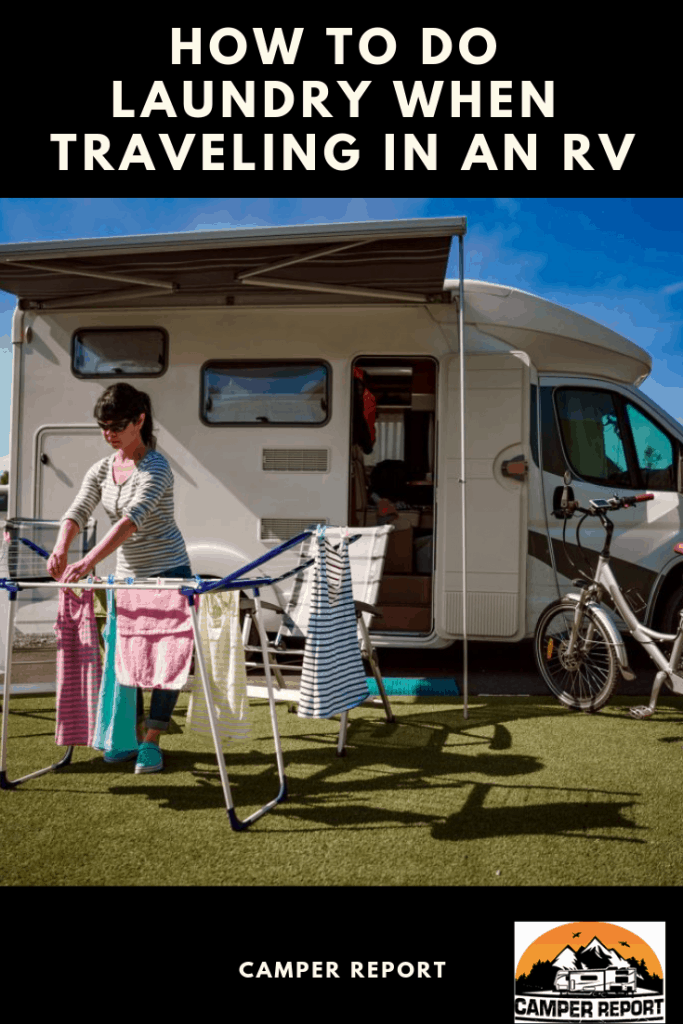
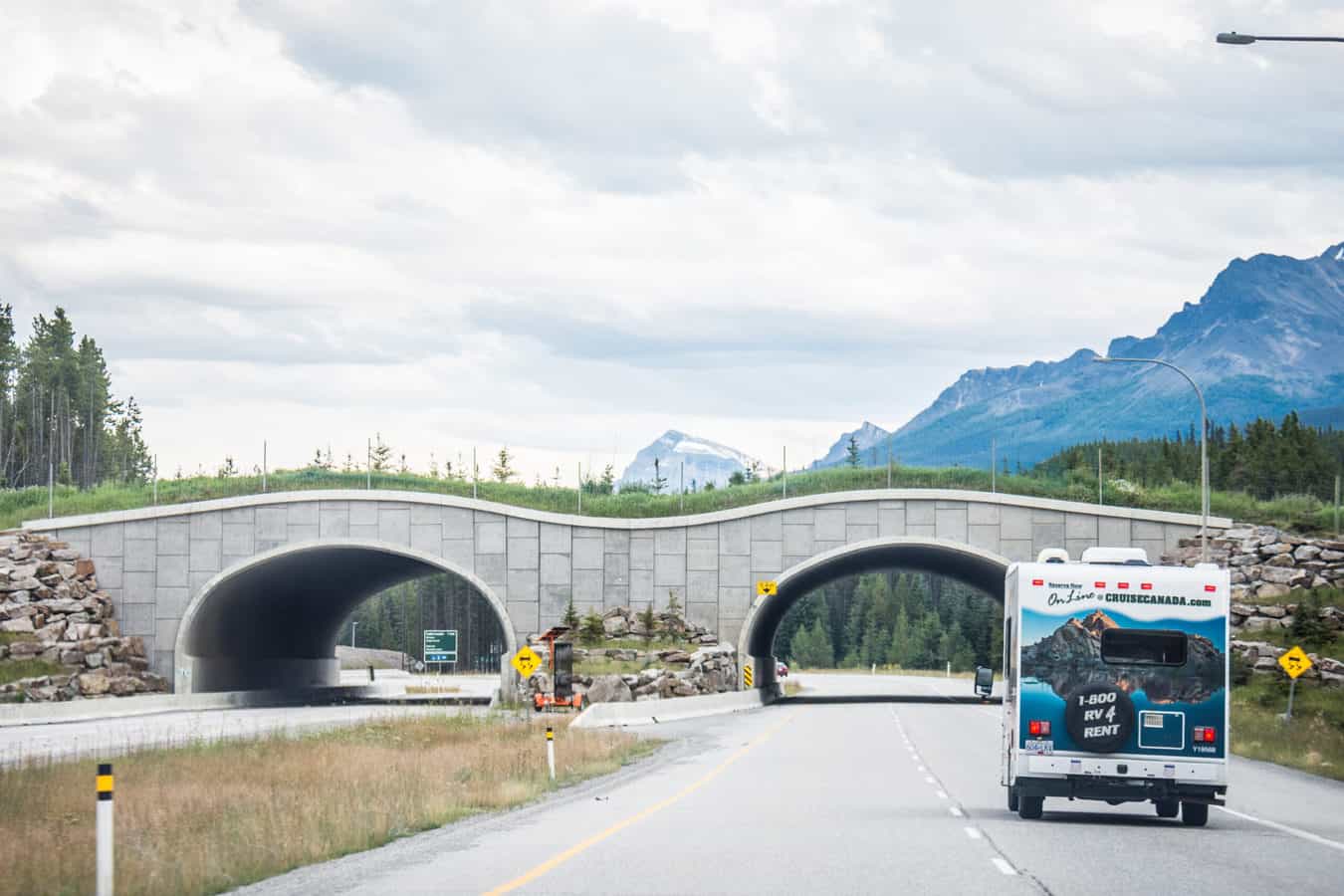
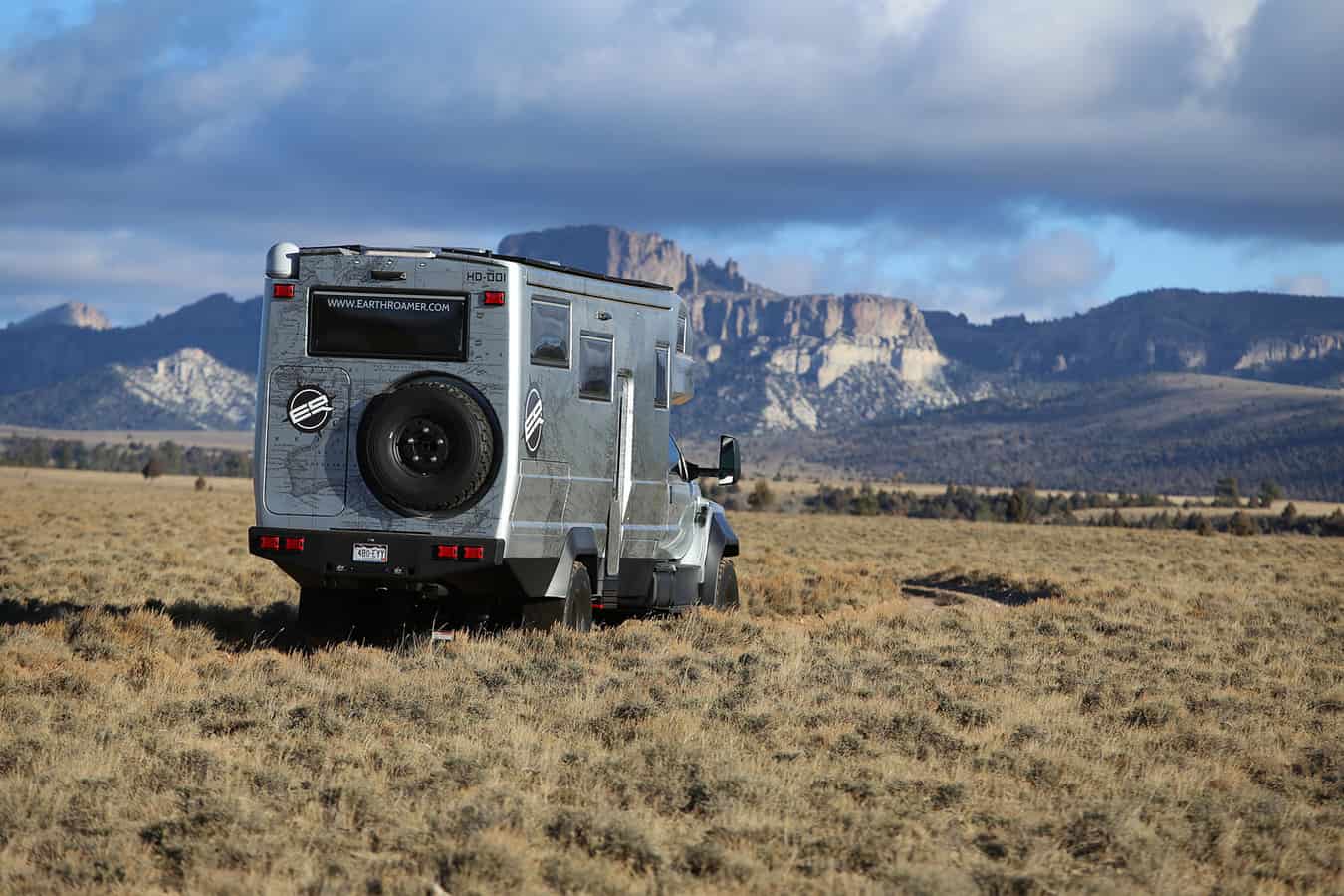
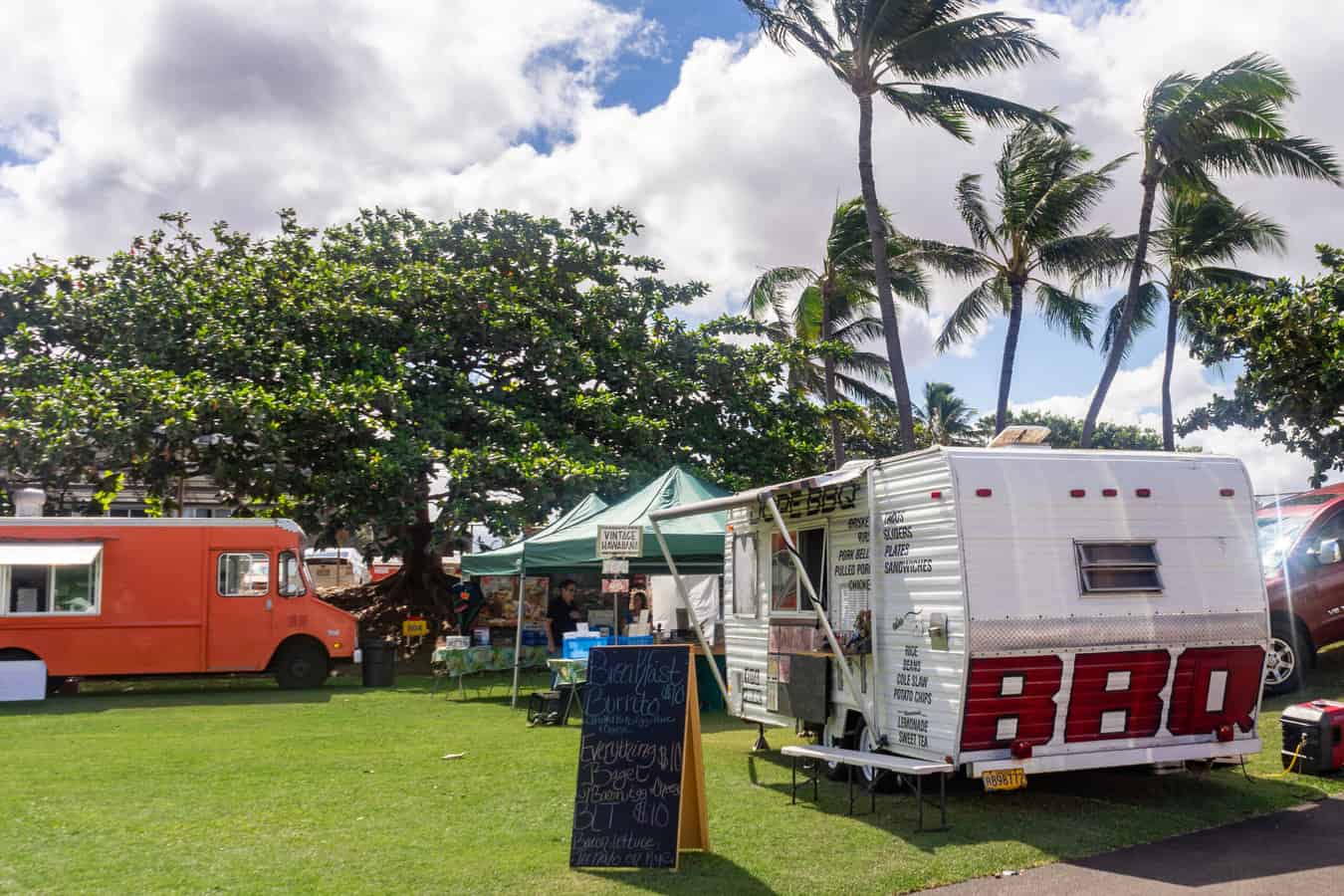
I’m not sure I understand the photograph and the verbiage above about hanging your clothes out to dry. As full timers, we mainly stay at low or medium cost RV parks (when we aren’t boondocking), and I have yet to find a park that lets anyone hang out their laundry to dry. Not a single park have I ever seen this permitted. Not only that, but some RV parks don’t even “allow” you to wash your clothes in your own RV! (Something about damage to their water treatment equipment, but most likely really due to wanting to make even more money off of their laundry facilities.)